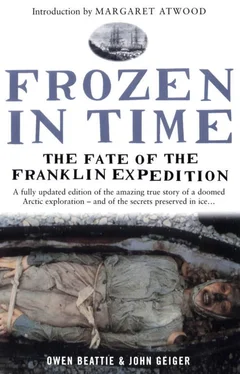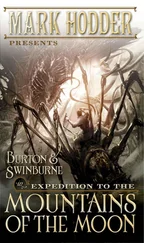While slow to enforce the benefits of lime juice, the Royal Navy nevertheless moved swiftly to embrace a technology that it was convinced also had powerful antiscorbutic properties: tinned food. Prior to the 1810 introduction of tinned meats and vegetables, expeditions were reliant on dry foods that could be stored for long periods of time, such as salt beef and salt pork, biscuits, pemmican and flour. However, spoilage, insects and rodents played havoc with such stores—none of which had antiscorbutic properties. Therefore, the discovery of the value of preserving food in airtight metal containers offered a liberation of sorts. In theory, expeditions of ever-greater duration might now be planned, knowing that there would be a reliable onboard source of meats, vegetables, fruits and soups that would maintain their nutritive value throughout an expedition. It was this simple invention, tinned meats and vegetables, together with the navy’s success with lime juice, that convinced the Admiralty that lengthy Arctic discovery voyages such as Franklin’s were possible.
Yet, though tinned foods enjoyed a great reputation for warding off scurvy, their antiscorbutic benefits had not been proven, and, in fact, were grossly overrated. The nature of the canning process of the day, which required that tins be nearly immersed in boiling water or saltwater, destroyed any ascorbic acid they may have contained, so that their tinned meats, vegetables, soups and even fruits were virtually useless as antiscorbutics. Still, received opinion held that scurvy could be staved off on Arctic voyages by liberal diets of tinned meats and vegetables, along with a daily allotment of lime juice.
The skeleton found near Booth Point by the University of Alberta researchers in 1981 proved otherwise. It left little doubt that, during the final year of the Franklin expedition (and probably earlier), scurvy was a factor in the declining health of the crews and an important contributor to the expedition’s disastrous outcome.
Other findings also preyed upon the minds of the researchers, however: the unusual distribution of the bones near the entrance of the tent circle, the fact that certain bones were present yet others were missing and the discovery of cut marks on the skeleton’s right femur. Also noted by Beattie were the angularity of the cranial fragments and the identifiable convergence of fracture lines, indicating that the skull was forcibly broken. He paused over the evidence before him and briefly considered the possibility that this young sailor had suffered an end far more terrible than that described in the historic Inuit accounts—that Franklin’s crew “fell down and died as they walked along.” Was this the first physical evidence found to support another Inuit claim: that in their final days, the sailors had been reduced to cannibalism?
The discovery of the bones at Booth Point would prompt, over the next five years, three further scientific expeditions into the Canadian Arctic. With each of these investigations, new leads would be pursued and unravelled, culminating in the exhumation of the preserved corpses of three of Franklin’s sailors on Beechey Island in 1984 and 1986, allowing Beattie and his colleagues an unprecedented look into a world very different from our own. By opening this window into the past, they became the first to piece together accurately the events that led to the destruction of the greatest enterprise in the annals of polar exploration.
“The discovery of a north-west passage to India and China has always been considered as an object peculiarly British.” With these words, John Barrow, Second Secretary to the Admiralty, announced that, at the end of the Napoleonic Wars, Britain was to embark on a great age of polar discovery. For in the nineteenth century, the greatest epoch of geographic exploration ever known, a primary British aim was to establish the existence of a Northwest Passage (the successful navigation from the Atlantic to the Pacific around America’s northern extremity); another was to reach the North Pole. In a little over five decades, from 1818 to 1876, dozens of Royal Navy ships would reach the polar sea. In the process, the Arctic archipelago, that vast labyrinth of land and ice that lies to the north of America, was made almost entirely known.
In most respects, this age of marine exploration was a triumph of geographic and scientific advancement. Yet, despite an enormous investment of resources and manpower, the Royal Navy failed to achieve the two goals set for it by Parliament. When the last official British Arctic expedition returned in 1876 to newspaper headlines proclaiming “The Polar Failure,” no ship had succeeded in navigating the Northwest Passage and no one had yet reached the North Pole. Those prizes were left for others. It was not until 1905 that Roald Amundsen, a Norwegian, would complete the first successful navigation of the Northwest Passage; in 1909, the North Pole was claimed by Robert Peary, an American.
Is it possible that the forensic investigation of human remains from that era, specifically the Franklin expedition disaster of 1845–48, would provide some insight into this larger failure? Certainly the terrible fate of Sir John Franklin’s expedition marked the nadir of Arctic exploration: a disappearance of two ships with all 129 of their men, which preyed strongly upon the British mind. Alongside the Franklin disaster, though, were numerous more routine exploration failures that, whilst lacking the sheer melancholic grandeur of the Franklin disaster, were just as frightful and inexorable. For one word appears time and again in their expedition narratives, a word that represents none of the usual suspects: neither ice traps nor perpetual darkness, marauding polar bears nor the minus 50°F (-46°C) cold—but simply, “debility.”
“Debility” plagued Arctic expeditions of the 19th century.
In his 1836–37 voyage of discovery, for instance, Captain George Back complained of the “languor,” “incoherency” and “debility” suffered by his crew. In 1848–49, Sir James Clark Ross similarly reported that many of his men were made “useless from lameness and debility.” Five years later, in 1854, Captain George Henry Richards also wrote of a “general debility” afflicting his crew; four years after that, in 1859, all members of Captain Leopold M’Clintock’s expedition aboard the Fox were struck down by “debility.”
It is an endless catalogue strung together by one simple word.
AT THE OUTSET, the Admiralty’s John Barrow believed that the Northwest Passage was easily navigable and predicted this would be achieved in a matter of months. There was simply no conception of the impediment an ocean of ice would pose to Britain’s exploration ambitions. Those hopes would first be set back in 1818, when Captain John Ross sailed into Lancaster Sound—the true entrance of the passage—only to adjudge it a bay, then compounded his blunder by naming the “bay” in Barrow’s honour. Then in 1819, Barrow dispatched twenty-eight-year-old Lieutenant William Edward Parry with two ships, the Hecla and Griper, and a youthful crew to do that which, in Barrow’s words, “Ross, from misapprehension, indifference or incapacity, had failed to do.”
The polar regions, as perceived by Victorian England.
Parry entered Lancaster Sound and, with a stiff wind behind him, bore westward. A vast, unexplored channel lay open before the two ships. The masts were crowded with officers and men the entire day. Parry, every bit the Regency gentleman, sought to conceal his own excitement, but did remark upon the “almost breathless anxiety… now visible in every countenance.” The Hecla and Griper blew past the precipitous cliffs and stratified buttresses of Devon Island to the north and, to the south, passed a series of channels to which Parry assigned names: Navy Board Inlet, Admiralty Inlet and Prince Regent Inlet. He saved for Barrow a particular distinction: naming the channel that lay due west after him. Thus, Lancaster Sound gave way to Barrow Strait.
Читать дальше










